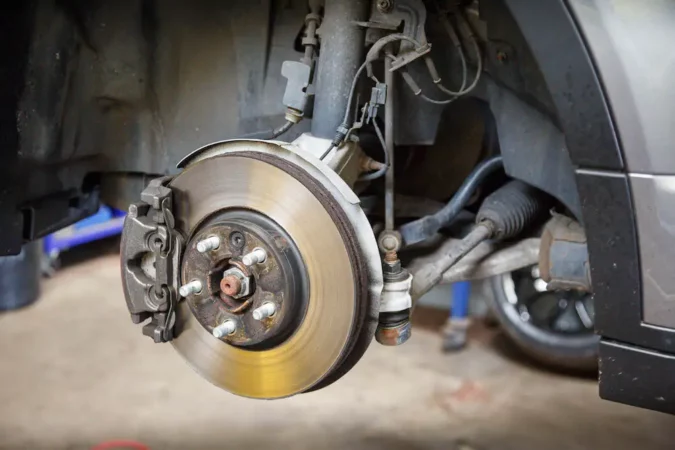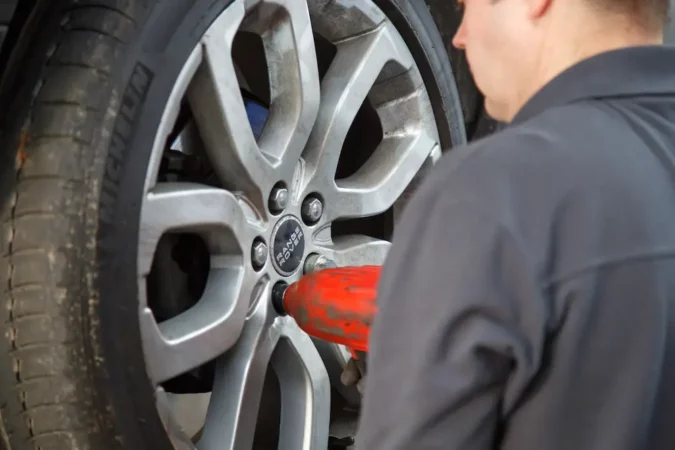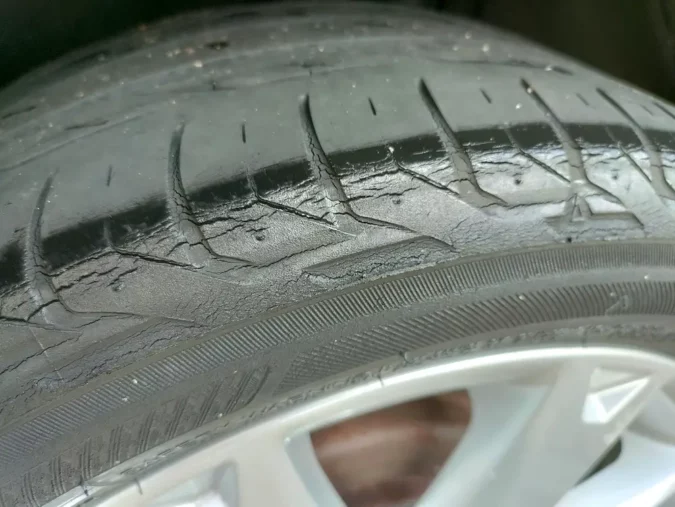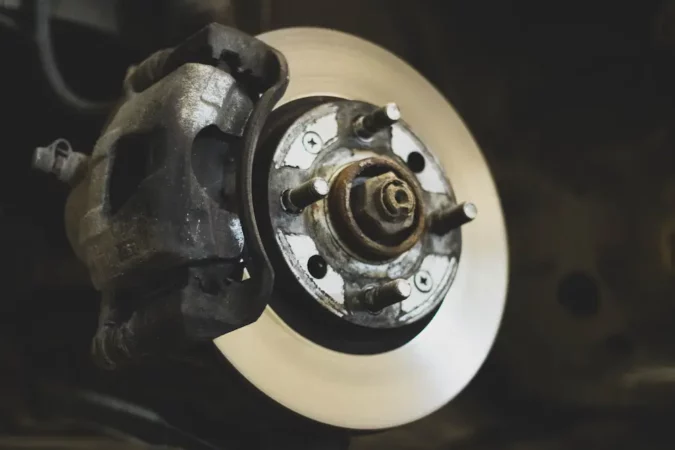Nothing ensures a driver more than a firm and well-balanced car, especially at high speeds. So, it can be worrying when your vehicle starts shaking and bouncing while driving down the road. Have you recently started wondering “why does my car shake?” Well then, you have come to the right place.
There are many reasons why a car might start shaking. It can happen due to an engine issue, faulty suspension, or something else entirely. Continuing to drive your vehicle while it is in this condition is just a disaster waiting to happen.
Having a clear understanding of the sources of the issue will go a long way in helping you perform the necessary repairs. Not only that, but it will help you save both time and money down the line as well. As a car can shake while you are performing various actions, let’s start off by taking a look at why it might happen under braking.
Car Shakes When Braking
When you push the brake pedal, you expect it to be firm and reassuring. However, this is not the case every time. One occasion where many drivers find themselves wondering “why does my car shake” is when they press the brake pedal.
There are several reasons why a car might start to shake under deceleration, with the most common ones being,
- Sticky Calipers
- Dry Guide Pins
- Tire Imbalance
- Worn Brake Rotors
- Deformed Brake Drums
- Suspension Issues
- Overloading
- Low-Quality Tires
- Road Conditions
Now, we will take a deep dive into each of these issues in order to learn how they make your car shake when braking.
Car Shakes When Braking #1 – Sticky Calipers
Almost all braking systems on modern vehicles are powered by hydraulics. When you engage the brakes, the chambers in the calipers are filled with hydraulic fluid. This causes the brake caliper pistons to push outwards and rub against the rotors, which creates friction.
This friction is responsible for slowing down your vehicle and bringing it to a stop. However, as the car ages, the hydraulic pressure which activates the brakes tend to get weaker. This typically happens when the vehicle has clocked up around 50,000 to 80,000 miles. Due to the weak hydraulic pressure, you then get a sticking brake caliper.
If your brake calipers have become stuck, you’ll feel vibrations through the steering wheel. In short, instances where your steering wheel shakes at low speeds and when your steering wheel shakes when braking downhill. These will be the most noticeable when the vehicle is traveling at speeds between 45 to 50 mph.
Other than shaking, some other symptoms of stuck brake calipers include the car pulling to one side, unresponsive brakes, and poor acceleration. Furthermore, the brakes may start giving off a burning odor if you squeeze them for too long.
For more insight, do check out our guides on the replacement cost for brake calipers, and the cost of a new brake caliper.
Car Shakes When Braking #2 – Dry Guide Pins
The brake calipers of your vehicle come equipped from the factory with two caliper guide pins. These take the form of round metal pins, and they make sure that the brake pads meet the brake rotor at the correct angle.
In order for the guide pins to function as intended, they need to be well-lubricated and free of dirt. Dry guide pins may corrode, resulting in the brake calipers getting stuck. As we discussed earlier, stuck brake calipers cause your car to vibrate once you hit the brakes.
The best way to avoid dry guide pins is by inspecting them regularly. The ideal time to do this is when you are replacing the brake pads. After removing the wheel, take a good look at the guide pins on top of the caliper for any signs of corrosion.
Ensure that they haven’t rusted in place by removing them using either a screwdriver or a caliper pin removal tool. If the guide pins have no visible damage or corrosion, it is perfectly safe to reuse them. However, before being inserted back into the caliper housing, they need to be thoroughly lubricated.
First of all, give the guide pins a thorough cleaning to remove any dirt or grease. Then, coat them in a layer of synthetic, high-temperature grease. After that, you can safely insert them back into the caliper housing.
Car Shakes When Braking #3 – Tire Imbalance
Out-of-balance tires are another common issue that makes drivers wonder “why does my car shake?” when they hit the anchors. One of the most significant symptoms of out-of-balance tires is the vehicle shivering between the speeds of 50 and 70 mph.
Balanced tires ensure that the weight of the vehicle is distributed evenly. During tire balancing (note the cost to mount and balance tires), a mechanic will first mount the tires onto a machine specifically designed for this task. Then, they will install precise tire weights that properly balance the tire assembly.
Unbalanced tires happen when one of these wheel weights moves out of position. This can happen due to a variety of reasons, including hitting curbs and driving over potholes. Furthermore, the flat spots that form when you leave your vehicle stationary for a significant amount of time also cause tire imbalances.
Dents in the rim (necessitating that you spend more on a bent rim repair cost) and bubbled tire sidewalls are two signs which indicate that your tires may be out of balance. Given the importance of the tire sidewall, any tire sidewall damage needs to be taken seriously.
When driving, you will feel shaking due to tire imbalances through the seats, floor, and steering wheel. In addition, this will cause uneven tire wear as well. If you are suspicious that out-of-balance tires are the reason behind your vehicle shaking, the best thing to do is to take your vehicle to the nearest tire shop.
There, the technicians will inspect your tires and recommend what to do next. Once you’re done, you then have to consider the cost of a tire balancing job.
Car Shakes When Braking #4 – Worn Brake Rotors
Brake rotors are one of the most crucial parts of your braking system. These take the shape of large metal disks and attach to the hub assembly of each wheel. The rotors reside between the two brake pads, which push against them to slow down the vehicle.
As you continue to use your brakes over a long period of time, the brake rotors may become warped. This happens due to a variety of reasons for bad rotors (and knowing how to tell if rotor is bad), or how to tell if you need new rotors, such as excessive heat, tightening the wheel lugs over the recommended limit, and leaving your vehicle unused for a long period of time.
The best fix for worn brake rotors is replacing them with brand-new ones. Although replacing the rotors is costly, you won’t have to worry about the car shaking for a while. On the other hand, resurfacing the rotors is a more cost-effective fix.
For more context, check out our detailed write-ups on how to resurface rotors and turning the brake rotor. But be warned, resurfaced rotors won’t last as long as new ones. After replacing the brake rotors, it is important to take care of them in order to prevent them from warping again.
Make sure that you only tighten the lug nuts up to the manufacturer’s recommended specification when reattaching the wheels. It’s better to use a torque wrench (and ensure that you know how to use torque wrench) instead of a pneumatic wrench to prevent accidental overtightening.
Car Shakes When Braking #5 – Deformed Brake Drums
Although most modern cars have disk brakes on all four corners, there are still a significant number of vehicles with rear drum brakes driving around our roads. And if you own one of these, you should be extra cautious when driving, especially if the vehicle shakes under braking.
Shaking of a drum brake-equipped car typically means that the rear drum brakes have either deformed or rusted out. You see, the rotors have to firmly contact the brake shoes in order to bring the car to a stop. This doesn’t happen when the rotors are damaged, resulting in you being left wondering “why does my car shake?”
Similar to rotors, replacing the brake drums is the most effective, long-term solution. You can also restore damaged brake pads by smoothing them out. Yet, it is important to be careful when doing so, as shaving off too much material can affect the integrity of the brake drums.
Car Shakes When Braking #6 – Suspension Issues
One of the primary reasons for your car shaking is issues with the suspension system. The suspension system is made up of several components, so there are plenty of things that could go wrong.
Some of the common suspension problems which may cause your car to shake include dented knuckles, loose tie rod ends, a bent axle shaft, and issues with the steering linkage. There are different signs that you can use to pinpoint the exact cause.
For example, signs of a faulty steering linkage include uneven tread wear and looseness of the steering wheel. Each of them would necessitate spending even more on suspension repair costs.
On the other hand, clunking noises from the underbody when driving over bumpy surfaces is one of the main indications of worn-out inner tie rods.
Suspension components are among some of the most expensive parts of a vehicle. So, rest assured that the repair bill won’t be cheap! But, it is important to get these problems fixed as soon as possible.
As the suspension system is one of the most critical areas of any vehicle, continuing to drive your vehicle when it is in a damaged state is an action that puts the lives of you and your loved ones at risk.
Car Shakes When Braking #7 – Overloading
Sometimes, the reason behind your car shaking might be simply due to you having too much weight inside or on it. Filling up your vehicle with people and goods to the point where the combined weight exceeds the maximum capacity of the vehicle is one of the prime ways in which the suspension system gets damaged.
This, in turn, results in the vehicle shaking when you press the brake pedal. Another way in which a vehicle can become overweight is when you overly customize it by fitting aftermarket accessories. SUV and pickup truck owners are the most guilty of this.
Although fitting light bars, lift kits, winches, bigger wheels, and aftermarket bumpers do indeed increase the capabilities of a vehicle to a certain extent, the weights of these components quickly add up.
Having these accessories will be all fun and games until the excess weight damages the CV joints or other suspension parts. Being self-restrained when accessorizing your vehicle is the best way to avoid car shudders due to overweight accessories.
Car Shakes When Braking #8 – Low-Quality Tires
Nowadays, there are hundreds of different tire brands you can choose from. Some come from well-reputed and recognizable brands that have been in the business for generations. However, there are also some knock-off brands that have questionable quality products for sale too.
As with other car parts, the higher the quality of tires – the more expensive they will be. This is why some people try to save a buck by going for a lesser-known and less expensive, often among the worst tire brands. But, you will quickly come to regret this decision once the vehicle starts to shake when driving down the road.
It is important to properly mount the tires of your choice onto your vehicle as well. Although you can mount all four tires on your own, it is better if you can have a mechanic do so for you. They will ensure that the tires are positioned correctly and that the wheel lugs are properly torqued.
Once you have the tires mounted, don’t forget to keep an eye on the tread level marker. When the tread level falls below this marker, it is time for yet another tire replacement. Overall, it is safe to say that the choice of tires plays a massive role in either making or not making your car shake once you apply the brakes.
For more insight into which ones you should choose, do check out our explainer on the best car tires. Not to mention, our list of the best brands of tires, and the top tire brands.
Car Shakes When Braking #9 – Road Conditions
On some occasions, your car might start shaking while braking even when there isn’t anything mechanically wrong. In this case, the most probable cause is rough road conditions.
You see, there is a high possibility of falling into ruts or running over some hard objects when you are driving down uneven roads. This may cause vibrations through the steering wheel. In addition, driving on roads of this nature can damage your rim or tire too.
If you frequently take your vehicle off-roading, you already know how much braking is involved in that sort of driving. The frequent application of brakes during off-roading wears out the rotors and pads quickly, leading to shakes when you put your foot down on the anchors.
Now you know almost all the different causes that can cause a car to shake when you hit the brakes. Next, let’s focus our attention on why your car might shake under acceleration.
Car Shakes When Accelerating
Although most issues that cause a car to shake when accelerating are minor, there are still cases where it may be an indication of something more severe. Here are a few of the most common culprits that make your car vibrate when you put your pedal to the metal.
- Loose Lug Nuts
- Axle Damage
- Bent Driveshaft
- Damaged Motor Mounts
- Issues With The CV Joints
1. Loose Lug Nuts
Similar to braking, the lug nuts can cause shaking during acceleration too. Loose lug nuts are one of the simplest problems behind wheel wobble, which the driver and passengers can feel as the car shaking, but it can get quite dangerous too. Therefore, you have to be diligent about what lug nut size to use.
If they are left untightened for long enough, they may get completely unattached from the hub, leading to the wheel separating from the vehicle. To say that you don’t want to have a detached wheel when accelerating down the road would be an understatement.
To prevent this from happening, use a true wrench to tighten each lug nut up to the factory specifications. And, one more thing, ensure that you are using lug nuts of the correct size. Using wrong-sized lug nuts also causes shaking under acceleration.
2. Axle Damage
Bent axles are another cause that makes a car shake when accelerating. Axle damage generally occurs when you drive over a large obstacle like a curb, a tree trunk, or a large rock. Furthermore, axle damage can be the result of a minor accident too.
If your vehicle has a bent axle, get ready for some bad news. There aren’t any reliable ways to repair a bad axle on the cheap. In other ways, you have to replace the entire axle to fix the shaking. And make sure to do it fast, as driving around with a bent axle carries the risk of causing further damage to your vehicle.
3. Bent Driveshaft
The same goes for bent driveshafts too. So, what does a driveshaft do? Well, rear-wheel drive (RWD) vehicles use the driveshaft to transfer power from the engine to the rear axle. When this part gets even slightly bent or damaged, you’ll start to feel vibrations,
Shakes due to a broken driveshaft start when you are accelerating at low speeds and will get worse when you begin to speed up. A drive shaft repair isn’t often possible, the only way to remedy this problem is by undertaking a drive shaft replacement and considering the cost to replace the driveshaft.
4. Damaged Motor Mounts
Have you ever wondered what keeps the engine attached to the frame of your vehicle? Well, the answer is the motor mount. And in addition to this, the motor mounts are responsible for dampening engine vibrations too.
To help them absorb vibrations, motor mounts are made using hard rubber. Over time, the rubber can wear out which damages the structure of the motor mounts.
Damaged motor mounts carry a lot of risks, including causing vibrations under acceleration as well as damaging the engine due to misalignment.
A car has several motor mounts, but the failure of one can affect the others too. This happens due to the additional load put on the remaining motor mounts. Although bad motor mounts typically start to show bad motor mount symptoms under acceleration, they may cause the car to shake even at idle.
You should take your car to a mechanic as soon as possible if you suspect it has bad motor mounts. At this point, you’ll have to prepare for the replacement cost of a new motor mount.
5. Issues With The CV Joints
The final problem which may cause your car to start shaking under acceleration is a damaged CV joint. Located at each end of the axle, the CV joints are responsible for connecting the wheels to the transmission system. Vehicles have both inner and outer CV joints.
If even one of these joints fails, your vehicle will be ridden with vibrations. You’ll also notice the bad CV joint noise. Generally, CV joints go bad because water and dirt enter them through tears in the joint boot. These vibrations will start out small, and get worse over time.
To fix vibrations due to a broken CV joint, you’ll either have to replace the joints themselves, However, more severe damage may require the CV axle to be replaced entirely. For more references as to what a repair might look like, do check out our guide on the replacement cost of a CV joint.
Why Does My Car Shake: In Conclusion…
Different issues may lead your vehicle to shake on different occasions. For example, if the car shakes when you are braking, it may be due to sticky calipers, out-of-balance tires, or dry guide pins.
On the other hand, damaged CV joints, axle damage, and bent driveshafts may cause your vehicle to start shaking under acceleration. No matter the cause, it is important to apply the necessary fixes as soon as possible. Continuing to drive the vehicle in a damaged state may end up getting you in catastrophic accidents.
Frequently Asked Questions
If you want to learn more about this, our FAQs here might help…
Why Does My Car Shake When I Brake
There are many reasons why your car might shake when you push the brake pedal. Some of the most common causes include suspension issues, worn calipers, deformed rotors, and imbalanced tires.
Why Does My Steering Wheel Shake
Bad bearings are the most common issue which causes steering wheel shake. Unbalanced tires are another well-known cause of steering wheel shake.
Why Does My Car Shake When I Accelerate
If your car starts to shake while you are accelerating, it might be a good idea to take a look at its axles. A damaged or bent axle is regarded by many to be one of the leading causes of car vibrations, especially when accelerating.
Why Does My Car Shake At High Speeds
Similar to braking and accelerating, a car can start to shake at high speeds too. The most common causes of this issue include damaged tires and uneven tread wear.
Why Is My Engine Shaking
Your engine might be shaking due to a misfire. As faulty spark plugs are one of the main reasons behind misfires, it might be worthwhile to take a look at them and replace damaged ones as needed.




